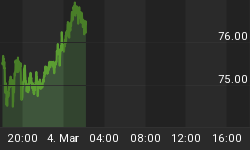Central banks across the globe have succeeded in creating a worldwide bull market in most asset classes and we now approach a watershed moment in international markets. Will central bankers keep fueling this rally by lowering interest rates and increasing the money supply, or will they opt to fight the inflationary spiral they created and cause this liquidity boom to dry up -- sending asset prices correcting across the globe?
Slow Growth to Continue
Market strategists who in early 2006 predicted a slowdown in economic growth have been proven correct. Since then we have seen GDP growth slow from 5.6% in Q1 2006 to 1.26% in Q1 2007 (which may be revised lower due to a higher than expected trade deficit).
Based largely on the correction in the housing market, this correction will have another leg down as the rate of new home construction is still outpacing new home sales by 600k units per year. Home builders need to drop new construction rates to near 1mm units per annum to stop adding to inventories, which means a precipitous reduction in employment numbers (a lagging indicator) is likely still ahead of us.
The consumer is also being squeezed from higher energy costs and elevated inflation while piling on more debt and maintaining his negative savings rate. It is reasonable, then, to extrapolate that a slowing economy and slowing earnings growth should mitigate equity market returns. Earnings growth is indeed slowing and even that growth is being artificially boosted by companies issuing debt to buy back shares, which makes the earnings look better than they would otherwise be. Further, the slowdown in U.S. consumption should be felt across the globe, retarding G.D.P. growth worldwide.
Inflation to Remain Elevated
So what is the reason for the market's levitation act? We need look no further than the y-o-y increase in global money supply, which is running at an average annual rate of about 15%. Since this rate of increase far outstrips the growth in productivity, inflation is the inevitable result. And it is this devaluation of paper currencies that ends up propping up asset prices including stocks, bonds and real estate worldwide.
Just look at private equity deals (today's leveraged buyouts) that take advantage of low interest rates and ample liquidity to bid up shares and take supply out of the public market. No wonder when investors think they sniff out an end to this liquidity, e.g. the end of the Yen carry trade or China tightening reserve requirements, the markets go into a free-fall.
What Direction for Central Banks?
The conundrum for central bankers is that they are hesitant to inject further liquidity into the system while inflation is running at or above their target zones. Yet, they are also hesitant to tighten liquidity and cause another sell-off as occurred on February 27th when the Shanghai index fell nearly 9% and the Dow fell 3.3%. Nor does the Fed want to hike rates while G.D.P. growth is running well below trend.
More than ever, investors must keep a close eye on central banks, and in particular the U.S., Japan and China. It is my contention that the Fed's next move will be to cut rates in order to stave off a recession -- one that we are dangerously close to slipping into -- and for Japan and China to recant their recent salvos to restrain money and credit.
If Central Bankers begin to act responsibly, it will put an end to this liquidity boom and lead to a global bear market in asset prices. However, I believe the most likely outcome will be for a long overdue correction in equity prices to occur, one which will cause Fed Chairman Bernanke to further expand the creation of money and credit in order to prevent a deflationary spiral.
In due course, we will get clarity as to the path the world's central banks will choose. Until then, I suggest maintaining a neutral to overweight exposure to international equities and commodities and waiting for central banks to give the all clear signal that the liquidity boom will continue before adding to U.S. equity positions.















